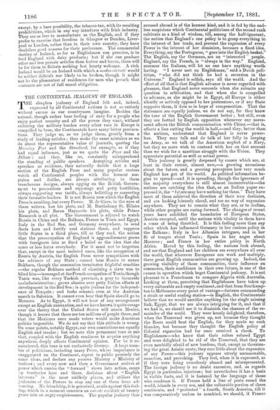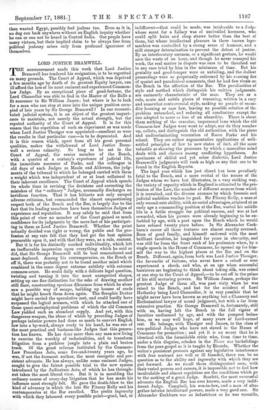THE CONTINENTAL JEALOUSY OF ENGLAND.
THE sleepless jealousy of England felt and, indeed, expressed by all Continental nations is not so entirely without excuse as our countrymen imagine. Besides the natural, though rather base feeling of envy for a people who enjoy perfect security and all the power they want, without enduring the military burden every other race in Europe is compelled to bear, the Continentals have many bitter provoca- tions. They judge us, as we judge them, greatly from a study of leading articles ; they make the same mistakes as we do about the representative value of journals, quoting the Morning Post and the Standard, for example, as if they had equal influence, just as we quote the Pays and the Debats ; and they, like us, constantly misapprehend the standing of public speakers. Accepting articles and speeches as evidence, they naturally decide that a large section of the English Press and many popular orators watch all Continental peoples with the keenest sus- picion and dislike, are always attributing to them treacherous designs, always egging on the British Govern- ]nant to precautions and espionage and petty hostilities, always suggesting war tariffs, always belittling or suspecting their favourite leaders. It is not Russia now which the English Press is assailing, but every Power. M. de Giers, in the eyes of these writers, has his plots, and M. Barthelemy St. Hilaire his plots, and Baron Haymerle his plots, while Prince Bismarck is all plot. The Government is adjured to watch Russia in China and the Balkans, France in Tunis and Egypt, Italy in the Red Sea, and Germany everywhere, to send fleets here and fortify coal stations there, and suppress little States in a third place, till as they read, the notion that the preoccupation of England is aggrandisement grows with foreigners into as fixed a belief as the idea that she more or less hates everybody. For it must not be forgotten that, except in the most isolated cases, like the occupation of Bosnia by Austria, the English Press never sympathises with the advance of any State ; cannot bear Russia to annex Bokhara, though the annexation terminates frightful cruelties —the regular Bokhara method of chastising a slave was to blind him—is enraged at the French occupation of Tunis, though Tunis was, like every Turkish province, a prey to incurable maladministration ; grows abusive over petty Italian efforts at development in the Red Sea : is quite jealous for the independ- ence of Tonquin ; and looks askance even at the Austrian march to Salonica. It cannot even bear that Spain should go to Morocco. As to Egypt, it will not hear of any arrangement except an English annexation, and we have known it quite savage over the theory that the United States will annex Mexico, though it knows that there are ten millions of people there, and that the Mexicans once made voters would make American politics impossible. We do not say that this attitude is wrong. On some points, notably Egypt, our own convictions are equally English and insular ; but we note this permanent tone as one that, coupled with the English readiness to acquire anything anywhere, deeply affects Continental opinion. For be it re- membered, this tone is not exclusively literary. A large num- ber of politicians, including many Peers, whase importance is exaggerated on the Continent, repeat in public precisely the same ideas, and declare any passive Ministry a Ministry of traitors ; and every now and then a Government arrives at power which carries the " forward " views into action, snaps up territories here and there, declaims about "English interests" in the most unlikely places, and utilises the jealousies of the Powers to stop any one of them from ad- vancing: No friendship, it is perceived, avails against this feel- ing, which in a moment converts an entente cordiale of twenty years into an angry suspiciousness. The popular jealousy thus
aroused abroad is of the keenest kind, and it is fed by the end- less suspicions which Continental politicians of the second rank cultivate as a kind of wisdom, till, among the half-ignorant,. the notion that England's one policy is to grasp everything in the interest of her trade, and prevent the expansion of every Power in the interest of her dominion, becomes a fixed idea. Everything, say the Portuguese, "goes into the English basket." The English, say the Germans, are an " interested " people. England, say the French, is "always in the way." England,. murmur the Italians, will let no one have anything worth.
having. "I never met an Englishman," said a Dutch poli- tician, "who did not think he had a reversion in the- Universe." England is selfish, says all the world. And the. effect of all that is that English advance is never regarded witk pleasure, that England never succeeds when she submits any question to arbitration, and that when she is compelled to advance, as she might be in Egypt, all Europe is either silently or actively opposed to her pretensions, or if any State supports them, it does so in hope of compensation. That the statesmen are equally jealous, we do not say, for they know- the tone of the English Government better ; but still, even. they are fretted by English opposition whenever any move- ment affects the British communication with China,—that is,. affects a line cutting the world in half,—and they, better than, the nations, understand that England is never power- less. They may talk and do talk of her folly in keeping no Army, as we talk of the American neglect of a Navy,. but they no more wish to contend with her on that account than we wish for a maritime struggle with the Union. They appreciate potential as well as actual power.
This jealousy is greatly deepened by causes which are, at least in their extent, almost new,—a growing uneasiness. about the future, and a growing perception how very much. England has got of the world. As political information be- gins to spread—and it is spreading, though the ignorance of the majority everywhere is still almost inconceivable—the nations are catching the idea that, as an Italian paper ex- pressed it, the "future may have nothing for them." They have- most of them achieved the direction of their own destinies, and are looking leisurely ahead, and see no way of expansion anywhere. They are to remain what they are, or to decline, while other peoples are racing forward. The changes of recent years have solidified the boundaries of European States, Austria excepted, until the nations with vitality in them have- a sense of being throttled. It is this feeling more than any other which has influenced Germany in her curious policy in. the Balkans ; Italy in her Albanian intrigues, and in her fit of temper about Tunis ; Spain in her anger about Morocco ; and France in her entire policy in North. Africa. Moved by this feeling, the nations look abroad, and see that England and her children are everywhere all over the world, that wherever Europeans can work and multiply, there great English communities are growing up. Indeed, the- growing visibility of those communities, their influence on commerce, their confidence in their own future, is one of the causes in operation which beget Continental jealousy. It is not pleasant to a Frenchman to compare Algeria with Australia. Looking at them, perceiving that Englishmen have taken up. every culturable and empty continent, and that from Southamp- ton to Melbourne every point of vantage—fortress commanding a strait or useful coaling station—is English, the Continentals believe that we would sacrifice anything for the single missing link, Egypt, that we are always intriguing for it, and that if we had it, we should use it to diminish the chances of the re- mainder of the world. They were keenly delighted, therefore,. when the Transvaal was given up, not because they thought the Boers could beat the English, for they made no such blunder, but because they thought the English policy of Colonial expansion had for once received a check. To- Englishmen—who know that their rulers refused Egypt and were delighted to be rid of the Transvaal, that they are- even morbidly afraid of new burdens, that, except as threaten- ing the great Asiatic route, they care little about the expansion of any Power—this jealousy appears utterly unreasonable,. causeless, and provoking. They feel, when it is expressed, as if they were being causelessly abused and misrepresented. The foreign jealousy is no doubt excessive, and, as regards Egypt in particular, injurious ; but nevertheless it has a basis in visible facts, and it is fostered by the language of those- who condemn it. If France held a line of posts round the world, islands in every sea and the culturable portion of three continents, and " protectd " a fourth, South America, till it was comparatively useless to mankind, we should, if France then wanted Egypt, possibly feel jealous too. Even as it is, no dog can bark anywhere without an English inquiry whether he can or can not be heard in Central India. Our people have many virtues, but their implied claim to be always free from political jealousy arises only from profound ignorance of themselves.































 Previous page
Previous page